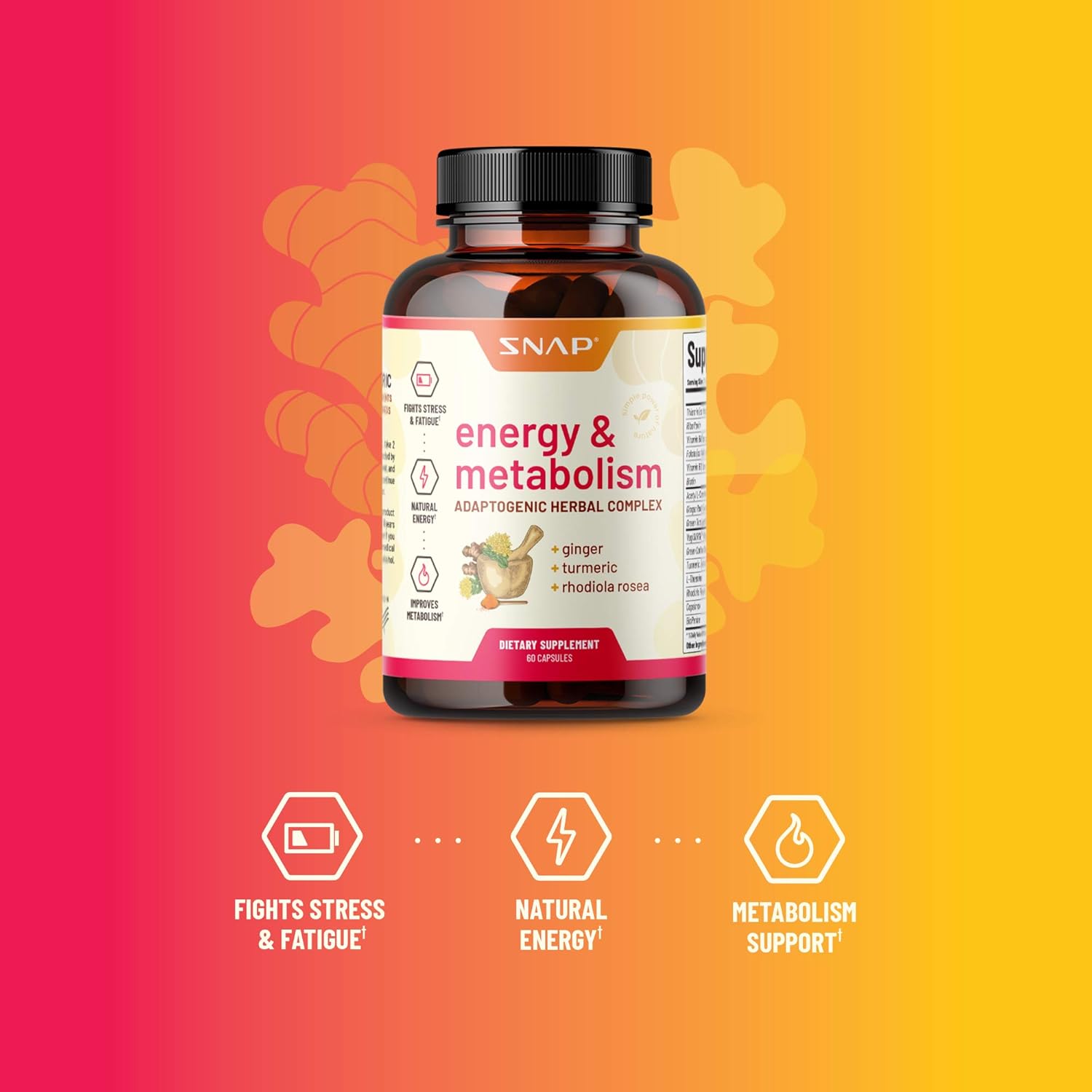Have you ever wondered how some people stay lean despite eating everything that comes their way? Meanwhile, there are others like you who gain those extra calories even when they’re on a diet.
The trophy winner here is—good metabolism.
It is metabolism that helps you convert complex molecules into energy, which is then utilized for bodily functions. These functions include the growth, repair, and maintenance of cells, as well as supporting essential activities like breathing, digestion, and physical activity.
When you have a good metabolism, this process occurs at a faster rate, making you feel active throughout the day.
On the contrary, if your metabolism isn’t supportive, it will manifest as fatigue, weight gain, dry skin and hair, constipation, mood swings, poor concentration, hormonal imbalances, and more.
So, let’s dive into this concept and explore ways to improve our metabolism.
What is Metabolism?
Metabolism is converting nutrients into energy. The process by which our body breaks down complex molecules (macronutrients) like carbohydrates, fats, and proteins into a simple form of energy is called metabolism.
A higher metabolic rate means you burn more calories even while at rest. Furthermore, there are numerous factors that can influence your metabolism, such as age, diet, body composition, sex, body size, physical activity levels, health status, and any medications you may be using.
🎭 Fun Fact
Studies suggest that the average person’s metabolism can be up to 15% faster in the morning than in the evening.
Fortunately, there are several evidence-based strategies that can help boost your metabolism, aiding in weight management and promoting overall health.
Strategies to Accelerate Metabolism
By implementing these strategies into your daily routine, you can effectively enhance your metabolism and support your overall health and fitness goals.
#1: Include Protein in your diet
Incorporating protein-rich foods into your diet is essential for boosting metabolism. Protein has a higher thermic effect than fats and carbohydrates, meaning your body burns more calories by digesting it. This can lead to increased energy expenditure throughout the day.
Try to include foods like lean meats, fish, eggs, legumes, and dairy products. It will not only support muscle growth and repair but also help you feel fuller for longer, reducing the likelihood of overeating. Also, aim to include a source of protein in each meal to maximize its metabolic benefits.
Create a Meal Plan
Design a week’s worth of meals focusing on protein-rich and whole foods to boost metabolism.
Studies have shown that diets high in protein can lead to more significant weight loss and improved body composition.
#2: Exercise is the Key
Regular physical activity is crucial for accelerating metabolism. Both aerobic exercises, like running or cycling, and strength training can significantly enhance metabolic rate. Strength training builds muscle, which burns more calories at rest than fat.
Research-based Study
Research indicates that individuals who engage in strength training can increase their resting metabolic rate by about 7-8%.
High-Intensity Interval Training (HIIT) is particularly effective, as it combines short bursts of intense activity with rest periods, resulting in increased calorie burn even after the workout. You can incorporate a mix of cardiovascular and strength exercises into your routine, which can elevate your metabolism, improve your overall fitness, and contribute to weight loss and maintenance.
#3: Maintain Proper Hydration
Staying well-hydrated is vital for optimal metabolic function. Water is involved in numerous metabolic processes, including the breakdown of food and the transport of nutrients. This is where drinking adequate water can temporarily increase your metabolic rate, especially if you consume cold water, as your body uses energy to warm it up.
Did You Know?
Drinking cold water can increase your metabolic rate by approximately 30% for about 30-40 minutes!
Drink at least 8 cups (64 ounces) of water daily, adjusting for activity level and climate. Additionally, staying hydrated helps reduce fatigue and improves exercise performance—making it easier to stay active and maintain a healthy metabolism.
#4: Ensure Proper Sleep
Adequate sleep is crucial for maintaining a healthy metabolism. Lack of sleep can disrupt hormonal balance, particularly hormones like ghrelin and leptin, which regulate hunger and appetite. Insufficient sleep may lead to increased cravings for high-calorie foods and decreased energy expenditure.
Try to have 7-9 hours of quality sleep each night to support metabolic health. Establishing a regular sleep schedule, creating a restful environment, and avoiding screens before bedtime can improve sleep quality, thereby positively impacting your metabolism and overall well-being.
#5: Limit Processed Foods
Limiting processed foods is essential for maintaining a healthy metabolism. Many processed foods are high in added sugars, unhealthy fats, and empty calories, which can lead to weight gain and metabolic dysregulation.
These foods often lack essential nutrients and fiber, leading to increased hunger and cravings. Instead, focus on whole, nutrient-dense foods such as fruits, vegetables, whole grains, and lean proteins. By prioritizing natural foods, you’ll not only support your metabolism but also improve overall health and reduce the risk of chronic diseases.
#6: Include Supplements
While a balanced diet should be your primary source of nutrients, certain supplements can support metabolic health. For instance, protein powders can help you meet your protein needs, while omega-3 fatty acids can reduce inflammation and promote fat oxidation. Green tea extract is known for its potential to enhance fat burning and boost metabolism.
Make sure you always consult with a healthcare professional before starting any supplements to ensure they align with your health goals and do not interfere with any medications. By integrating beneficial supplements into your routine, you can enhance your metabolic rate and overall health.
Quick Tips to Accelerate Metabolism
- Incorporate Strength Training: Build muscle through resistance exercises to increase your resting metabolic rate.
- Engage in High-Intensity Interval Training (HIIT): Short bursts of intense activity followed by rest can boost metabolism significantly.
- Stay Hydrated: Drink plenty of water throughout the day; cold water can temporarily increase metabolic rate.
- Eat Protein-Rich Foods: Include lean meats, fish, eggs, beans, and legumes in your diet to enhance the thermic effect of food.
- Get Enough Sleep: Aim for 7-9 hours of quality sleep each night to support metabolic health and hormone balance.
- Limit Sugar and Processed Foods: Reducing your intake of high-sugar and high-fat processed foods can help maintain a healthy metabolism.
- Drink Green Tea or Coffee: These beverages contain compounds that can enhance metabolic rate and fat oxidation.
- Snack Smart: Opt for healthy snacks like nuts, seeds, and yogurt to keep your metabolism active between meals.
- Stay Active Throughout the Day: Incorporate movement into your routine, such as walking, standing, or taking the stairs, to increase daily calorie expenditure.
- Manage Stress Levels: Practice mindfulness, meditation, or yoga to reduce stress, as high stress can negatively impact metabolic function.
Conclusion
In conclusion, understanding and supporting your metabolism is essential for maintaining overall health and achieving your fitness goals. By adopting a balanced diet, incorporating regular physical activity, staying hydrated, and prioritizing sleep, you can effectively boost your metabolic rate.
Embrace these strategies to enhance your energy levels, promote weight management, and improve your well-being. Remember, small, consistent changes can lead to significant results over time.
FAQs
To speed up your metabolism, engage in regular physical activity, especially strength training and high-intensity interval training (HIIT). Incorporate more protein into your diet, stay hydrated, and get enough sleep. Drinking green tea or coffee in moderation can also help, as they contain compounds that temporarily boost metabolic rate.
A slow metabolism can be caused by various factors, including genetics, age, hormonal imbalances, and a sedentary lifestyle. Additionally, insufficient muscle mass, poor diet, and lack of physical activity can contribute to a slower metabolic rate.
To fix a slow metabolism, focus on increasing physical activity, particularly strength training, to build muscle mass. Eat a balanced diet rich in whole foods, prioritize protein, stay hydrated, and ensure adequate sleep. Consulting a healthcare professional can also help identify underlying issues and create a personalized plan.
As we age, our metabolism naturally slows down due to a decrease in muscle mass and hormonal changes. This decline can lead to weight gain if dietary habits remain the same. However, engaging in regular exercise, especially strength training, can help counteract this effect and maintain a healthy metabolism.
While some metabolism supplements claim to boost metabolic rate, their safety and effectiveness can vary widely. It’s essential to consult a healthcare professional before using any supplements, as they can have side effects and interact with medications. A balanced diet and lifestyle changes are often more effective and safer long-term solutions.





















